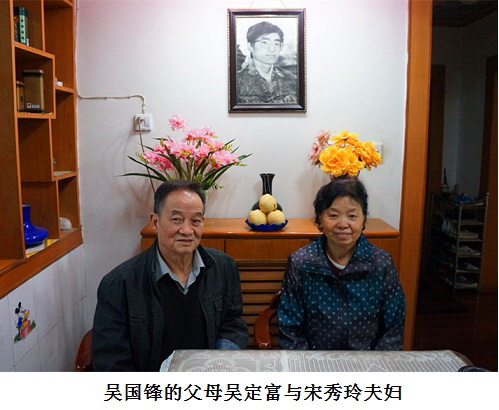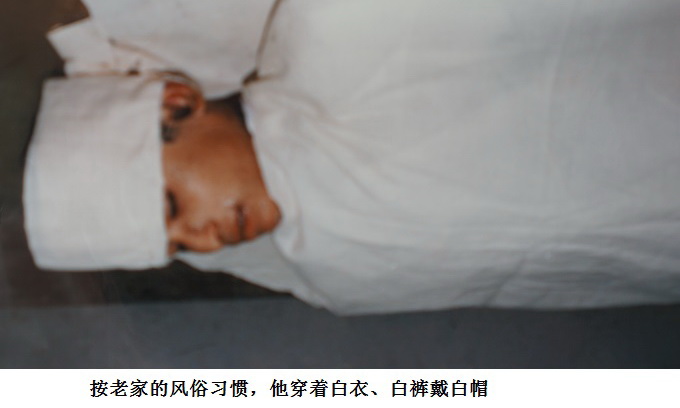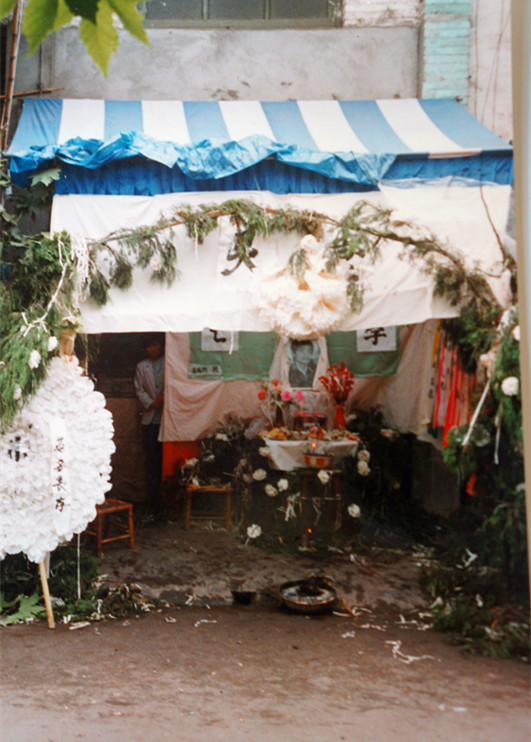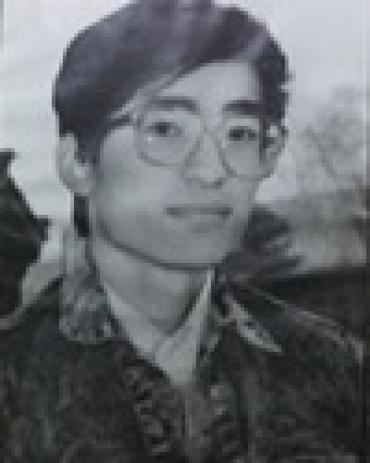[Translation by Human Rights in China]
After Wu Lihong and I visited Xiao Zongyou and his wife, we decided to visit Wu Guofeng’s (吴国锋) parents, Wu Dingfu (吴定富) and his wife, who live in the suburbs of Chengdu in Xinjin County, Wujin Township.
The drive from Chengdu to Xinjin County is actually not that far. We did the driving ourselves, and it took a little more than an hour. The Wus’ original home was demolished in the late 1990s, so they bought a new place. Their current home has three bedrooms and a living room. The furnishings were simple, but the place was kept very clean and tidy by Mrs. Wu.
As soon as we came through the door, we saw a photo of their son, Wu Guofeng, hanging on the wall. This small shrine is where the parents communicate with their son’s spirit.
Wu Dingfu, 70, is a retired worker of a concrete factory in Xinjin County. His wife, Song Xiuling, 67 years old, does not have a formal job. She once operated a small shop outside their home. After their home was demolished, the store was gone too. The couple has three children. The eldest is their daughter, who lives in Wuhan. (This daughter’s child already has a 4-year-old daughter—so the Wus have become great grandparents.) Next they had two boys. The second child was Wu Guofeng. The youngest, Wu Guobin, passed away in September 2001 due to untreatable uremia. Wu Guobin’s wife remarried and does not keep in touch with them but she left behind the daughter she and Wu Guobin had. That daughter now lives with Wu Dingfu and his wife and is in middle school.

Wu Dingfu and Song Xiuling, parents of Wu Guofeng.
The following is an edited transcript of our conversation with Wu Dingfu and his wife, with our description of what we know about Wu Guofeng’s death.
You Weijie: “We’ve come to visit you on behalf of June Fourth victims’ families in Beijing. Now that we are face-to-face, please tell us about Wu Guofeng and his situation that year.”
Wu Dingfu: “He was in the industrial economics department of Renmin University. That year he was 21 years old—well, just one month shy of 21. His birthday was July 3. He was a junior in college.
“In April 1989, Wu Guofeng wrote us a very long letter, which talked about Hu Yaobang’s death and how the students were mourning him. He also said he participated in some of the memorial events and wrote some poems to commemorate Hu. He wrote a great deal about the student movement. I wrote back, from the perspective of a parent, urging him not to participate in those kinds of political activities and not to place too much trust in the Communist Party. I told him that he fundamentally didn’t understand the Communist Party, and that I had lived for many decades and seen the kinds of extremely cruel tactics that the Communist Party used to deal with the people who didn’t agree with them. I said that joining in might invite trouble, even death.”
You Weijie: “This letter was written out of love for your child.”
Wu Dingfu: “Yes, out of love. Our child tested into Renmin. In our tiny Xinjin County, he was the first one in forty years.”
You Weijie: “He must have studied very hard, and was very smart?”
Wu Dingfu: “He didn’t work hard, but he was smart. As for studying, you could say he had a photographic memory. He looked at something once and knew it.
“At that time, I told him: it is best not to get involved. From our vantage point looking back over the years, many people in political movements suffered all kinds of attacks. That really haunted us. We had become less and less interested in political movements.”
You Weijie: “Were either of you attacked during the Cultural Revolution?”
Wu Dingfu: “We saw that during the Great Cultural Revolution there were two fighting factions. When I was young, I too participated in the Youth League’s attacks on landlords. From the 1950s on, I lived through many political movements: the ‘Three Antis,’[1] the ‘Five Antis,’[2] the Anti-Rightist Movement, the ‘Four Cleanups,’[3] the Great Cultural Revolution. His mother’s maternal uncle was a professor at Southwest Normal University’s history department and was a China Democratic League member. During the Anti-Rightist Movement, he was labeled a rightist. Although he was not considered a ‘big’ rightist and was released after two or three years, his family was affected. All of this haunted us. I was afraid that my own kid didn’t have a sense of the seriousness of the situation, and that something would happen to him.”
After the letter was sent, Wu Guofeng never responded. His parents understood their son did not agree with them. The only thing they could do was follow the developments of the student movement in Beijing from where they were, and worry about their son.
You Weijie: “That year, students from all of Beijing’s universities were taking to the streets. In that kind of environment, it was impossible for him—in the middle of it all—to not participate.”
Wu Dingfu: “He could not not participate. His mother said, ‘How can you stop a young person from participating? You cannot control him, so let him go experience it.’”
You Weijie: “When it happened, did the school notify you?”
Wu Dingfu: “It was not the school that notified us. The school authorities notified the provincial authorities, who notified the county authorities. The county authorities notified the town government, who then notified us.
“One day later, we bought our tickets to Beijing. The school arranged for a deputy Party branch secretary Zhang and a few students to come meet us and settle us in a guest house. As we had arrived relatively late, the school did not meet with us right away, but let us rest. The second day, the school finally spoke with us about Wu Guofeng and told us what had happened to him.
“This was what we learned: the night before Guofeng died, the teacher in charge of Wu’s class, the department head, and the deputy Party secretary in the department came to the student recreation room and told the students not to go out, that the troops had already opened fire to end the demonstrations. They told the students that they could even stay in their dorms and learn to play mahjong. As soon as the teachers left, Wu Guofeng walked his bike off campus, carrying his camera. He said he wanted to go where things were happening and see with his own eyes.
“Also, a classmate of Wu Guofeng, called Li Xuedong, whose parents worked at the Chinese Academy of Social Sciences, kept us company while we were in Beijing and told us a lot about what was happening with Guofeng. He said that that Guofeng joined the marches from the beginning of the student movement, and that he went on hunger strike for five days in Tiananmen Square. He also said Guofeng took a lot of photos, which were confiscated.
“The schools asked us if we needed anything. At that time, I made two requests to the school: the first was that I wanted to pay to have my child’s remains sent back to Sichuan, because his aunts and grandmothers, still at home, didn’t get to see him and I wanted to let them see him one last time. The school said that they couldn’t do that, because the central government gave orders that all the deceased were to be cremated locally. Second, I wanted Guofeng’s body cleaned up. He came into this world clean and should leave clean. According to our hometown custom, an unmarried person who passed away is considered a filial son who sacrificed himself, and should wear a white shirt, white pants, and a white hat. The school said yes to this request.”

In keeping with the Wus’ hometown custom, Wu Guofeng was dressed in a white shirt, white pants, and a white hat.
The parents were devastated when they saw their son’s body at the Post and Telecommunications Hospital. It was covered from head to toe in blood, his head was encased in coagulated blood, his body had streaks of bloodstains running down it, and his eyes were open. The hospital used rubbing alcohol to clean the body. At Wu Dingfu’s request, they dressed Guofeng in a white shirt, pants, and hat. They held a small memorial ceremony at the hospital, and then sent the body to the Babaoshan crematorium to be cremated.
Originally, the school did not want the parents to go to the Babaoshan crematorium for fear that they would be upset. But Wu Dingfu and his wife insisted on going, to see their son off on his final journey, watch the cremation with their own eyes, and carry their son’s ashes back with their own hands. After the cremation, they got his ashes in the afternoon, stayed that night in Beijing, and then returned to Sichuan the following day.
Wu Dingfu: “When we were at the school, several of his classmates kept us company the whole time and told us about the student movement. They said Guofeng was a member of the organizing committee of the students association at the university. They said that after his hunger strike, they wanted him to go have a medical check-up, but he didn’t go and went to class just like before.”
You Weijie: “The organizing committee—was that during the student movement?”
Wu Dingfu: “It was the student organizing committee for activities to commemorate Hu Yaobang. Other schools established the Autonomous Federation of University Students. But at Renmin, they established this organizing committee.
“After Guofeng’s five-day hunger strike, the schools basically began to close. He sent us a telegram saying that he was getting ready to ride his bike home so that he could see what was happening in other places along the way. He asked us to mail him 200 yuan. I received this telegram on May 31. Although I sent the 200 yuan, I learned later when I got to Beijing that he had never received it. The money finally arrived as we were leaving the school. At the time the money was sent, all communication throughout the country was cut off, and we had no way of getting in touch with him.”
You Weijie: “Where was he killed?”
Wu Dingfu: “It ought to have been in the Xidan neighborhood. That’s closest to the Post and Telecommunications Hospital.”
Based on the information we have gathered from various sources, the following was what happened. Wu Guofeng left the campus alone, walking his bike. When he was on West Chang’An Avenue in the Xidan neighborhood, he ran into the martial law troops who were coming in from the west, heading towards Tiananmen Square. He was taking photos when he was hit in the back of the head by a bullet and fell to the ground—but he had not died. A soldier came over to grab his camera from his hand, but Wu Guofeng would not give it to him. In the course of the struggle, Wu Guofeng was stabbed in his lower abdomen by the solider with a bayonet. There was a two-inch long cut. Wu Guofeng clenched the wound with both hands, and the palms of his hands had obvious blade marks. One can infer that he used the last bit of strength in his life to grab at the bayonet that stabbed him. Afterwards, an elderly person took him to the Post and Telecommunications Hospital. He died right after he told the elderly man his school. Wu Guofeng had a watch and a student ID card with him. The hospital filled out his death certificate based on the account by the elderly man and the information on the student ID card.

Shrine set up by Wu Guofeng’s parents in front of their shop.
When Wu Dingfu and his wife came home, looking at their son’s ashes, they could not reconcile their feelings of resentment. They thought about their son, who had excelled in his studies. At every school in Xinjin County, from elementary school to middle school, he was always a student among the “three goods”: healthy, studious, and moral. Three years earlier, their son had scored the highest in humanities in all of Xinjin County and tested into Beijing’s Renmin University of China. He became a sensation throughout the county—a lot of people knew his name. After talking it over, the couple decided that they had to let everyone in Xinjin County know that their son had been killed for no reason. So they set up a shrine in front of their small shop on Zhengdong Street in Wujin Township.
Wu Dingfu: “Our small store was on a large street. Many people walked along that street, especially every Tuesday, which was market day. The people who were there for the market all came to see the shrine. Many people cursed after they looked at it, and every single person, without exception, felt sorry about his death. We have a teachers’ training school in town, and the teachers and students of that school lined up with wreaths to come into the shrine to mourn Guofeng. His classmates, his teachers, those who knew him and those who didn’t, they all sent wreaths to express their sorrow.”
You Weijie: “The local government did not interfere?”
Wu Dingfu: “The local government didn’t interfere because the entire county knew—and everyone was very sympathetic. The local government, before they had received any direction from above, did not dare intervene. Three days after the shrine was set up, around June 22—we had returned from Beijing on June 18—the county wanted to announce to the people what Deng Xiaoping had told high-level military officers. So they sent the county’s deputy Party secretary and the town’s Party secretary to talk to me. The county’s deputy Party secretary’s ancestral old home was on the same street as mine. In school, he was two years ahead of me, so we could talk easily. He told me that they were preparing to deliver Deng Xiaoping’s message to the county’s people the following day, and that the shrine we set up along the main street really stuck out and was sending a negative message to the people. He suggested that we take it down since it had already been up for three days. I agreed, but I had this request: I would take down the shrine on the street, but I wanted to set one up inside the shop. He said OK and that we could keep it there for as long as we wanted. The shrine inside the shop was visible from the outside through the window. So the relocation was just a formality.”
You Weijie: “Are Wu Guofeng’s ashes still at your home?”
Wu Dingfu: “At first, his ashes were at home. I made a glass cabinet and put his ashes inside. We brought them to our new place after our old home was demolished. I once promised Teacher Ding Zilin[4] that I would always keep the ashes in our home. Later, after my youngest son died of uremia, my friends and family, including my daughter and my parents, all urged me to bury both my sons’ ashes, so that they would rest in peace.”
You Weijie: “Are their ashes buried in a public cemetery?”
Wu Dingfu: “No, I didn’t have the money to buy plots in a cemetery, so we had to look at private land and collective farm land. Through a close friend, we bought a plot on a small mountain, which cost about 3,000 yuan. After my youngest son got uremia, I spent all my demolition and relocation compensation money on his treatment. When teacher Ding found out about this, she called me. After I told her the situation in detail, she sent me some money. Other warmhearted friends in Chengdu also helped us. The help enabled my youngest son to live six months longer. Still, he did not recover.”
If you go across the street from where Wu Dingfu and his wife live now and down an alley, you will come to the Minjiang River tributary, which passes through the entire Wujin town. Standing on the riverbank, you can see a stone bridge. On the other side of the stone bridge is the little mountain where the two brothers are buried. The mountain is full of trees, verdant and lush. On top of the mountain is a small pavilion. If you drive, it only takes just a little over 20 minutes to get there.
We drove Wu Dingfu and his wife to the mountain to Wu Guofeng’s grave. On the mountain, there were some farm houses—vacation homes where many town and city people stay on the weekend. Many pomelo trees grow all around the homes. If you pass these homes, turn a corner, and go along a small path deep into the woods, you will come to a hillside. A path up the hill will lead you to the grave on the private land. Wu Guofeng’s grave is framed by bricks, and concrete paves the area around the grave. Engraved on the tombstone: “Beloved Son Wu Guofeng, born on the eighth day of the sixth lunar month in 1968, died on the first day of the fifth lunar month in 1989.”
The June Fourth tragedy happened 24 years ago. As Wu Dingfu and his wife talked about their child’s death, tears still flowed from their eyes. They said: “Although our son’s ashes are buried, we have kept the shrine in our home. We have not forgotten, even for a moment, how our son lay there all covered in blood.”
Wu Dingfu: “We had sent our son to Beijing to study, and he was shot to death for no reason. To date, the government has not given us any explanation. Sometimes, they even harass us. The public security people once came to us and told us not to go to Beijing, not to make trouble. But we refuse to obey them. What right do they have to mess with us? On June 4 each year, we openly burn paper offerings on the main street. Then, they privately went to our daughter to try to make her urge us not to make trouble, or else, they said to her, they would lose their jobs. Thinking about this, I feel so suffocated—as if a rock were pressing down on my heart.”
Wu Dingfu and his wife: “We, together with the families of more than 100 other victims, have put forth our demands to the government. We have persisted for more than 20 years with no result. We will continue to press on and not stop. If one generation is not enough, there is another generation. Even though we live in a small town, our hearts will forever stand together with the families of the other victims. We are determined to support all of the decisions of the victims’ families and are determined to join them—until the June Fourth question has been resolved.”
Editor’s note: Two additional photos of Wu Guofeng’s body, showing wounds on his body and face graphically, are available in the original Chinese version of this essay.
Translator's Notes:
[1] The “Three Antis” was a campaign in 1951-52 that targeted corruption, waste, and bureaucratism within state bodies and state owned enterprises.
[2] Focused on private enterprises, the “Five Antis” was a political movement in 1952 against bribery, tax evasion, sloppy work, theft of state property and assets, and theft of state economic information.
[3] The Four Cleanups Movement in 1963 targeted politics, the economy, organization, and ideology.
[4] Ding Zilin is a founding member of the Tiananmen Mothers.
© All Rights Reserved. For permission to reprint articles, please send requests to: communications@hrichina.org.

You Weijie (尤维洁) and Wu Lihong (吴丽虹) are members of the Tiananmen Mothers.
Wu Guofeng (吴国锋), 20, a student of industrial economics at Renmin University of China, in the entering class of 1986. In the evening of June 3, 1989, he was shot in the back of the head when riding his bike and carrying his camera. After he fell to the ground, he was stabbed in the abdomen with a bayonet. He had blade marks in the palms of both hands. An elderly person took him to the Post and Telecommunications Hospital, where he died.
Previously Issued